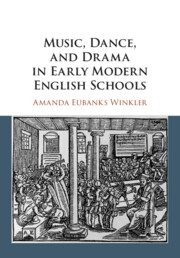Book contents
- Music, Dance, and Drama in Early Modern English Schools
- Music, Dance, and Drama in Early Modern English Schools
- Copyright page
- Dedication
- Contents
- Figures
- Tables
- Music Examples
- Preface
- Editorial Method
- Abbreviations and RISM Sigla
- Introduction
- 1 Situating Pedagogical Performance
- 2 Performing Piety
- 3 Performing Prestige
- 4 Performing Accomplishment
- 5 Performing Vice
- 6 Performing the Professional
- 7 Performing the Past: The Specter of the Schoolroom
- Bibliography
- Index
- References
Bibliography
Published online by Cambridge University Press: 14 May 2020
- Music, Dance, and Drama in Early Modern English Schools
- Music, Dance, and Drama in Early Modern English Schools
- Copyright page
- Dedication
- Contents
- Figures
- Tables
- Music Examples
- Preface
- Editorial Method
- Abbreviations and RISM Sigla
- Introduction
- 1 Situating Pedagogical Performance
- 2 Performing Piety
- 3 Performing Prestige
- 4 Performing Accomplishment
- 5 Performing Vice
- 6 Performing the Professional
- 7 Performing the Past: The Specter of the Schoolroom
- Bibliography
- Index
- References
- Type
- Chapter
- Information
- Music, Dance, and Drama in Early Modern English Schools , pp. 208 - 229Publisher: Cambridge University PressPrint publication year: 2020

